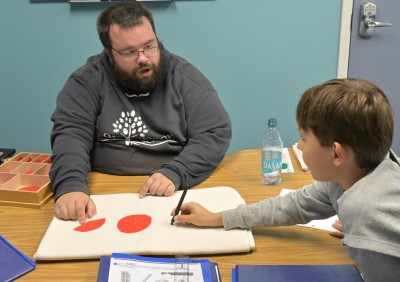“There is no shame in where kids are on their trajectory; they learn when they’re ready, so all kids feel successful. The emphasis is on individual mastery.”
-Oak Meadow parent
Come visit! Our Fall Open Houses are Oct. 18 & Nov. 15, 10am-12pm. Learn more
Oak Meadow’s Upper Elementary program provides for the unique developmental threshold at which fourth through sixth graders find themselves. While their social and academic growth advance at different rates, students are challenged intellectually in a comfortable, supportive environment that fosters confidence and independence.
A Day in Upper Elementary
Each day begins with a welcome from our Upper Elementary team and some social time for our students. Following a brief morning meeting to go over any announcements, students begin their work cycle. In the work cycle, students have small group lessons in math, geometry, language, grammar, writing, literature groups, and cultural studies (science/STEM, history, and geography). Students also use this time for community service or other leadership projects. After an hour total for recess and lunch, students have specials classes including Nature, Physical Education, Art, Music/Drama, Spanish, and Skills (a period of a child’s week where we focus on social-emotional and executive functioning skills).
Montessori Model United Nations (MMUN) offers 6th year students a unique capstone opportunity to engage in global issues through collaborative learning and diplomatic skills. Within the Montessori framework, participants research, debate, and negotiate solutions to real-world challenges, fostering critical thinking and effective communication. This project concludes with a conference in New York City where students work collaboratively with others from around the world to pass resolutions for their topics, and travel to the United Nations to present their resolutions at the General Assembly.
Explore the Upper Elementary Program curriculum below.

The Upper Elementary math and geometry program focuses on developing strong operational skills while progressing from concrete to abstract understanding. Students use hands-on materials to master core operations, solve multi-digit problems, and build fluency in math facts. As they advance, they explore fractions, decimals, percentages, ratios, and concepts like area, perimeter, and angles. Sixth-year students engage in investigation-based learning, deepening their understanding of factors, ratios, and real-world applications. For advanced learners, the curriculum may include pre-algebra concepts, such as linear relationships and three-dimensional geometry, preparing them for further studies in Middle School.
In Upper Elementary, our ELA curriculum offers a spiraling curriculum to support students in their journey from learning to read to reading to learn, focusing on comprehension, writing, grammar, and vocabulary. Fourth and fifth-year students participate in guided reading groups and explore creative writing while building spelling and grammar skills. By sixth year, ELA becomes interdisciplinary, with students applying reading, research, and writing skills to projects like Montessori Model United Nations position papers, lab reports, and literature analysis. This approach fosters a mastery orientation and independence in literacy and prepares students for advanced academic work in Middle School.
Cosmic education, a core element of the Montessori philosophy, emphasizes understanding the interconnectedness of all things. It encourages holistic learning by integrating subjects like science, history, and art, fostering critical thinking and creativity. Children explore global issues and environmental stewardship, developing empathy and social responsibility. This nurturing environment inspires a lifelong love of learning and curiosity about the universe and humanity’s place within it.
In Montessori education, student plans are individualized to cater to meet each child where they are academically and developmentally. This approach recognizes that every child learns differently and at their own speed. Teachers observe students closely to understand their needs and strengths, allowing them to create personalized learning paths.
Individualized plans foster independence and motivation, empowering children to take ownership of their learning. This customization helps ensure that each child remains engaged and challenged, ultimately promoting a deeper understanding of concepts.
In the Upper Elementary years, students develop a rich appreciation for culture as they begin to see themselves as part of a global community. Our studies in science, history, and geography are designed to help students expand their critical thinking skills through hands-on laboratory assignments, historic simulations, and research projects. Lessons in language, mathematics, and geometry are designed to help students see the real-world application of their studies through their cultural works and emphasis on developing abstract thought.
STEM education—science, technology, engineering, and mathematics—is vital in Montessori classrooms as it fosters hands-on learning and critical thinking. By engaging directly with materials, children make abstract concepts concrete, enhancing their understanding. STEM is integrated across subjects, demonstrating the connections between disciplines, and encouraging holistic learning. This approach nurtures curiosity and inquiry, allowing students to explore and discover. Collaborative projects help develop problem-solving skills and resilience, preparing them for real-world challenges. By incorporating STEM to everyday life, Montessori classrooms inspire a lifelong love of learning and equip children with essential skills for their future.